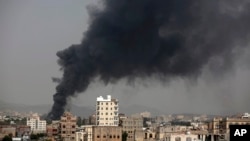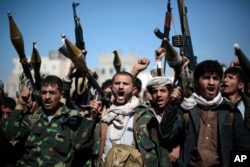Saudi-led coalition forces and their Yemeni allies fighting under the banner of President Mansour Hadi have captured several strategic ports on the Red Sea in recent weeks, and are vowing to try and pursue the largest prize, control over the Yemeni port of Hodeida.
The fight involves both an internal tug-of-war and a proxy battle between Iran and Saudi Arabia for influence over strategic waterways.
Saudi-backed Yemeni media recently broadcast video of Saudi-backed Yemeni militia fighters cheering after they seized part of the key Red Sea port of al-Mukha. The advance comes at the expense of Yemen’s Houthi militiamen, who control the capital, Sana'a, as well as the more important Red Sea port of Hodeida, 226 kilometers to the west.
Pro-Houthi media showed Yemenis fighting under the Houthi banner shouting that they would fight to defend the port of Hodeida until the death. One young man, dressed in a soccer shirt, claimed enthusiastically that he would gladly die to defend his country.
The pro-Houthi deputy governor of Hodeida province harangued a small crowd with patriotic rhetoric to assert that everyone supports the Houthis and will fight to keep control of Hodeida. Several officers from Yemen’s traditional military, loyal to former President Ali Abdullah Saleh, appear on camera as well but sound less enthusiastic.
A pro-Saudi Yemeni official noted that forces loyal to Hadi were advancing on ports near Hodeida, but that the Houthis were laying mines to try and stop them.
Gary Sick, veteran Iran analyst at Columbia University, tells VOA that Saudi efforts to gain control of Yemen's sea ports are like imposing a "siege around a castle."
"Controlling sea ports or making them unusable," he said, "makes it harder for the [adversary] to win, even if it's distasteful [from a humanitarian point of view]."
The Houthis’ loose coalition of mostly Shi’ite allies, including Iran and its proxy Hezbollah militia in Lebanon, have been waging both a media war and a shadowy campaign to help the Houthis against their Saudi nemesis, whom they are confronting by proxy elsewhere, in both Syria and Iraq.
Old Saudi-Iran rivalry
Lebanon’s Sheikh Hassan Nasrallah, who heads the pro-Iranian Hezbollah, claimed in a recent speech that Saudi Arabia has “always behaved as if Yemen was one of its own provinces” and cites a quote by Iran’s revolutionary leader Ayatollah Khomeini claiming that Yemen will “stick the Saudi royal family’s faces in the mud.”
Saudi military spokesman General Ahmed Assiri accused Iran recently of helping to support Houthi forces in the conflict, which began in March 2015, but gave no details.
Hilal Khashan, who teaches political science at the American University of Beirut told VOA, however, that he does not think Iranian military aid is decisive.
“Yemen has far more firearms than people. On average, there are three rifles to each Yemeni and when the Houthis took over most of Yemen [in 2015], they were able with the support of Ali Saleh to take over large quantities of Yemeni army weapons.”
Saudi media, nevertheless, continue to stress the theme that Iran’s presence in Yemen’s vital Red Sea ports could pose a threat to international maritime trade going through the strategic Bab al Mandeb strait. The Saudi coalition exerted a major effort to retake Yemen’s largest port city of Aden, as well as key islands surrounding it in 2015.
Former Iranian President Abolhassan Bani Sadr, for his part, questions claims of Iranian domination of the region or its strategic waterways, despite Iran’s rhetoric toward that end.
He said the [Iranian] regime propagates the theme that it can dominate the region in order to justify [its policies] to its own people, while in reality it is weak and unstable.
He added that Iran has sentimental attachments to Yemen due to both Yemen’s Zaidi Shi’ite beliefs, and its blood ties to ancient Iranian conquerors. Above and beyond those factors, he said, Iran fancies itself to be the leader of the Islamic world, a pretension it shares with rivals Saudi Arabia and Turkey.










